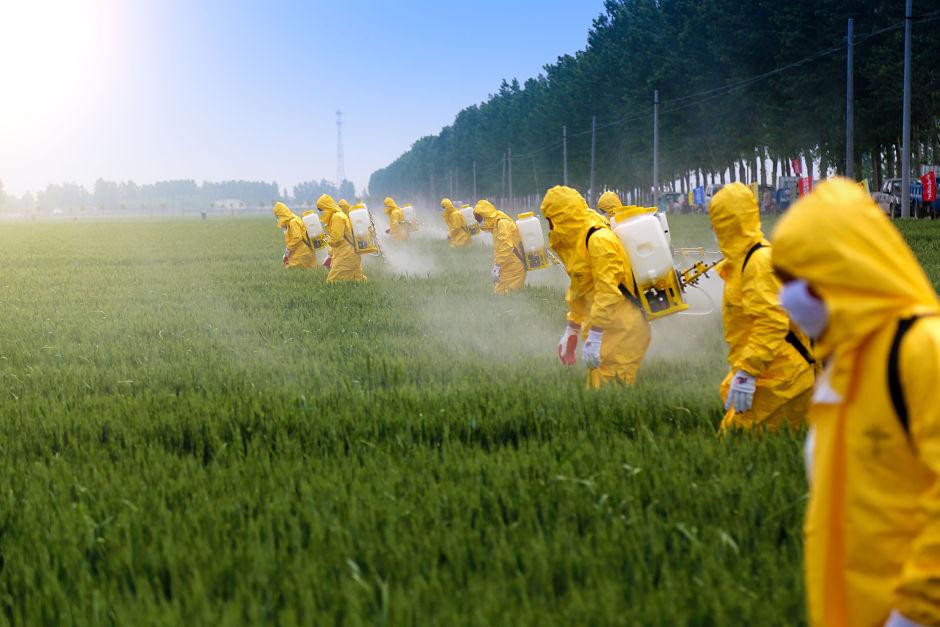This study, conducted in five countries and with the participation of the Museum of Natural Sciences of Barcelona and the University of Barcelona, indicates that the pesticide lambda-cyhalothrin, one of the most widely used in the EU, has a devastating effect on biodiversity. not only about the insects that damage crops, but also about the insects that are there and can be useful for agriculture.
According to the most recent estimates, this is so Insect diversity is declining at an alarming rate of 2.5% per yearwhich one translates into the loss of about 25,000 species each year.
In addition to climate change, habitat loss and other causes, many of which are unknown, experts agree that one of the main reasons for this decline is the massive use of synthetic pesticides in agriculture.. This is because these chemicals not only wipe out species that damage crops, but also have a devastating impact on the rest of the insect population, including those beneficial to important plant processes such as pollination, natural pest control and nutrient cycling.
The research led by the Jagiellonian University of Poland, with notable participation of the Museum of Natural Sciences of Barcelona and the University of Barcelona through the Biodiversity Research Institute, showed that lambda-cyhalothrin, a synthetic insecticide widely used at grain, tuber and fruit crops could threaten up to 98% of the beneficial insect species in these fields. The study questions the safety of this pesticide and calls for a review of risk assessment protocols before approving new compounds to protect biodiversity.
Significant side effects of lambda-cyhalothrin
Lambda-cyhalothrin is a fast-acting pyrethroid, widely used in the European Union and worldwide to control agricultural pests such as aphids, beetles and moths, as well as mosquitoes, flies and ticks that affect human health.. Unfortunately, published results show that when applied at the recommended dose, it has a very negative effect on all insects it comes into contact with.
«Lambda-cyhalothrin does not distinguish between pests and beneficial insects for crops and poses a threat to biodiversity“explains Berta Caballerocurator of arthropods at the Museum and co-author of the article.
Thus, the pesticide used to eliminate a specific aphid or fly would also kill ladybugs or spiders, which are their natural enemies. “We hope that the conclusions of this investigation will lead to a review and, where appropriate, a regulation of the use of lambda-cyhalothrin«says Caballero.
A comprehensive review of the use of lambda-cyhalothrin
To conduct the analyses, individuals of more than 50 different insect species were collected in representative fields of different climatic zones in five countries: Portugal, the United Kingdom, Germany, Poland and Spain. This extensive sampling allowed us to evaluate the effects of lambda-cyhalothrin on animals present in different agroecosystems under different environmental conditions..
Insects captured on crops such as rapeseed, wheat or olive trees were then exposed to increasing doses of the pesticide, with monitoring for 72 hours. “Just 5% of the recommended dose affects half of beneficial insect species, a figure that rises to 98% when the full dose is applied,” he laments. José Manuel Blanco-Morenoresearcher in agroecology from the Biodiversity Research Institute of the University of Barcelona and co-author of the study.
This study also calls into question the reliability of the previous studies approve new pesticidesbecause they are often based only on tests with one species: the honey bee. Despite its importance, this insect is not representative of biodiversity due to its genetic and biological peculiarities.
“The results of this study indicate an urgent need to redesign risk assessment procedures, integrating multiple types of approaches to more effectively protect biodiversity.“, concludes Blanco-Moreno.

